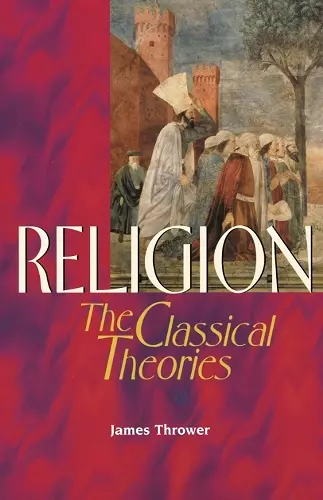Religion
The Classical Theories
Format:Paperback
Publisher:Edinburgh University Press
Published:24th Mar '99
Currently unavailable, and unfortunately no date known when it will be back

What is Religion?' This is the first text to review in a single volume the theories of religion which have been put forward by both believers and non-believers. 'Why theories of religion?' After raising and answering this question the author begins his examination of theories of religion by first looking at the explanations given by religious believers (Revelation and Religious Experience). He then considers the views of thinkers who have sought to transform religion into philosophy (Plato, Kant and Hegel), before reviewing the theories of those who have seen religion as arising out of errors in primitive thinking (Tylor, Frazer and Levy-Bruhl) and those 'masters of suspicion', as Paul Ricoeur has called them (Feuerbach, Nietzsche, Marx and Freud) who offered what they believed to be exhaustive psychological and sociological theories of the origin and nature of religion. In the course of his discussion the author also engages with many contemporary thinkers whose discussions of religion have been based on these classical accounts. In a brief conclusion the author tries to assess the future of the religions of the world in light of the increasingly close inter-religious encounters that are becoming a feature of the 'global village' of thetwenty-first century. Key Features * Comprehensive survey of the field * Theories will be considered against the phenomenon of religion world-wide * Theories offered in a way that lets the student make up his or her own mind
The book fills an important gap in the study of religions. It achieves in a clear and straightforward manner the aim of the author to supply a basic text for undergraduates and for an informed wider audience. After reading this book, students of religion will be well prepared to understand the context out of which the phenomenology of religion developed and then to proceed to further texts which will prepare them to engage in the methodological debates at the core of religious studies today. For this, we should be grateful to James Thrower and commend his book as a fitting conclusion to his distinguished academic career. James Thrower's unusually broad survey of theories of religion ranges from ancient times to modern and from theological approaches to social scientific ones. His expertise in an array of religious traditions enhances the value of this book. A lucid and incisive overview of the course of theorising about religion. -- Robert A. Segal, Reader in Theory of Religion, University of Lancaster This book offers a rare bridge across an artificial disciplinary divide which too often separates theorists of religion into two distinct groups: the social scientists and historians of religion on the one hand, and the philosophers on the other ... [Thrower offers] a quality introduction to the truly wide range of major theories and theorists in the analytical study of religion. -- Scott Alexander, Indiana University A marvellous survey of the theories of religion put forward by both religious and non-religious thinkers. It is broad, authoritative, well-written, accessible and, overall, easily the best introductory text on the subject I have come across ... he takes little for granted, carefully defining terms and providing necessary background information to religions, religious concepts, scholars, schools and movements. It is the kind of book that makes one feel like designing a new undergraduate module. A fine overview of the main theories of the origin and nature of the book ... well written, thorough and accurate. The book fills an important gap in the study of religions. It achieves in a clear and straightforward manner the aim of the author to supply a basic text for undergraduates and for an informed wider audience. After reading this book, students of religion will be well prepared to understand the context out of which the phenomenology of religion developed and then to proceed to further texts which will prepare them to engage in the methodological debates at the core of religious studies today. For this, we should be grateful to James Thrower and commend his book as a fitting conclusion to his distinguished academic career. James Thrower's unusually broad survey of theories of religion ranges from ancient times to modern and from theological approaches to social scientific ones. His expertise in an array of religious traditions enhances the value of this book. A lucid and incisive overview of the course of theorising about religion. This book offers a rare bridge across an artificial disciplinary divide which too often separates theorists of religion into two distinct groups: the social scientists and historians of religion on the one hand, and the philosophers on the other ... [Thrower offers] a quality introduction to the truly wide range of major theories and theorists in the analytical study of religion. A marvellous survey of the theories of religion put forward by both religious and non-religious thinkers. It is broad, authoritative, well-written, accessible and, overall, easily the best introductory text on the subject I have come across ... he takes little for granted, carefully defining terms and providing necessary background information to religions, religious concepts, scholars, schools and movements. It is the kind of book that makes one feel like designing a new undergraduate module. A fine overview of the main theories of the origin and nature of the book ... well written, thorough and accurate.
ISBN: 9780748610105
Dimensions: unknown
Weight: 343g
224 pages